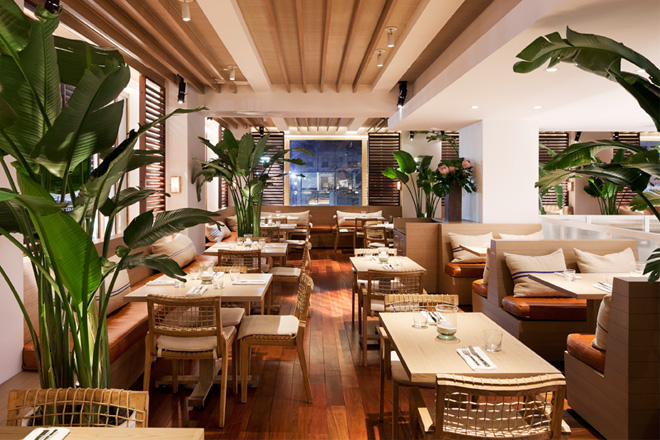An urban resort was the concept for Tommy Bahama’s Manhattan Island flagship store in an imressive landmark property on Fifth Avenue, The Fred F French Building. In addition to the retail space of apparel and accessories for men and women, the store features a bar and restaurant.
Designed by Michael Neumann Architecture, materials evoke an easy tropical lifestyle in the retail space – sandy-coloured limestone floors, weathered oak plank ceilings that resemble the underside of a boardwalk, whitewashed poplar millwork and window louvres of salvaged Ipe wood from the Coney Island boardwalk.
The double-height main atrium space connects to the restaurant above, and contains full height cage-like display fixtures of blackened steel and hardware accents of tarnished brass that provide an edgy, more urban contrast to the relaxed palette.
A 4.2m live-edge elm wood table for display of apparel, objects and books is a focal element within the double height space. Bespoke oversized lanterns of brass and blackened steel light the atrium opening, against a backdrop of full height perforated white metal screens depicting abstracted beach palms.
Custom display tables and riser boxes take cues from campaign style furniture, evoking the backstory of the world traveller. Further into the store, the adjoining women’s retail space suggests a whitewashed cabana interior draped with diaphanous linen, with whitewashed display fixtures and floors, and a brass and crystal chandelier.
The Marlin Bar has its own Fifth Avenue entrance featuring a monumental blackened steel and Ipe spiral stair with a decorative metal rail of wrapped brass roping that leads to the restaurant above.
Within the Marlin Bar a row of oak barrels ageing speciality rum is displayed against a white metal, back-lit custom screen that suggests palm tree bark or fish scales.
Walls of reclaimed oak boards, and window louvres – salvaged from the infamous Coney Island boardwalk – line the main bar room.
For the intimate backroom, a hand-painted mural of a tropical rainforest provides a richly romantic setting.
Up the spiral stair, the Tommy Bahama restaurant expands over the second floor space, with a central opening to the retail store below. The restaurant features a lively open kitchen next to a second full bar area that overlooks the atrium.
Wide plank Ipe floorboards, weathered rafters with a linen-panelled ceiling, weathered oak tables and teak chairs reference the palette of a seaside resort. Perimeter banquettes with distressed leather cushions and vintage French linen pillows, brass and cut glass deco wall sconces, ceiling fans and potted palms create an atmosphere that is both tropical and luxurious.



